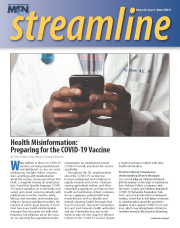After detasseling corn, some of Iowa’s migrant agricultural workers return to Mexico for a two-week break, before riding the bus north once more at the start of the corn harvesting season in the fall. After an outbreak in a camp that resulted in hospital admissions, Caroline Johnson, FNP, from Proteus, Inc. in Iowa recognized an opportunity to slow the advancement of COVID-19 by carefully orchestrating agricultural worker return through a close collaboration with a farm owner and by leaning on the partnerships that Proteus had already built with the state’s laboratory and other local and state health authorities.
At one large family-owned operation, the workers return from their break to their communal living facility that houses around 600 H2A agricultural workers in bunkbeds, with locker-room style bathrooms and communal dining halls.
“We developed a strategy to assign workers to a particular seat on the bus for the entire ride by a numbering system,” Johnson explained. “Once they arrived, Proteus would be there to test.” They also did an initial screening; any worker who screened positive, regardless of test results, was isolated. All other workers were provided hotel rooms, food, and water as they awaited test results. A worker shared a hotel room with just one other worker, again according to the numbering system, to minimize contact between workers during the wait. The state laboratory, with which Proteus had collaborated, was alerted of the expedited nature of the tests. Those who tested negative returned to the communal housing. Any worker who tested positive was isolated in trailers owned by the farm owner, to be retested ten days later. Those who were in close contact with a positive worker – as determined by the numbering system -- completed a quarantine and were retested on day ten, before returning to the communal housing. Finally, anyone who needed a retest on day ten and tested positive were isolated for ten more days in farm-provided housing or in a hotel, and with air conditioning and a water supply – with the stipulation that initial workers who tested positive should not overlap with any workers who newly tested positive.
"And, it worked,” Johnson said. “We did not have outbreaks during the harvest season at this farm. Our relationship with the [farm owner], as well as the willingness of our state lab to expedite results for this testing event, helped keep farmworkers safe.”
Read this article in the Winter 2021 issue of Streamline here!
Sign up for our eNewsletter to receive bimonthly news from MCN, including announcements of the next Streamline.
